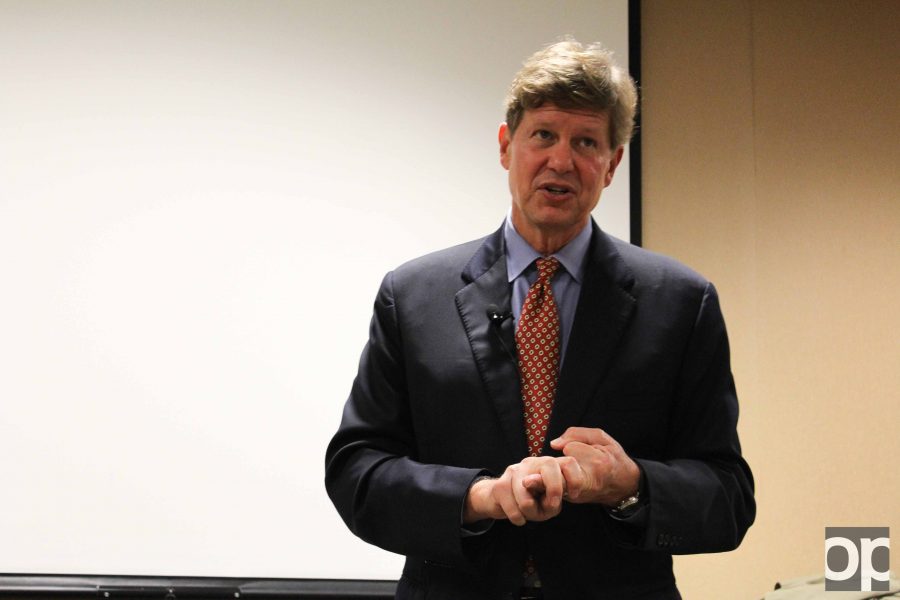Evangelism and politics discussed in Dartmouth professor’s lecture
Professor Randall Balmer of Dartmouth College speaks at Oakland University about religion and politics.
How Christian evangelicals have treated Donald Trump this election season was one topic addressed by Professor Randall Balmer when he visited Oakland University last week.
Balmer gave his lecture “Improbable Alliances: Religion and the 2016 Election” on Thursday, Oct. 27, in the Oakland Room of the Oakland Center.
He teaches religious studies at Dartmouth College in Hanover, New Hampshire, and has published books on religion and politics, including “God in the White House” and “Redeemer: The Life of Jimmy Carter.”
At the opening of his speech, Balmer asked, “How is it that the leaders of the religious right . . . can embrace a presidential candidate who seems to be the antithesis of family values, which they have been talking about for decades?”
He relied on history to help answer his question.
In the 19th century, evangelicals led many of the civil rights movements that were going on at the time, such as the abolishment of slavery and criminal justice reform. But in the early 20th century, Balmer said, evangelicals stopped supporting millennialism, a belief that Jesus Christ will return when the ideal kingdom of God is built, and switched to premillennialism, the belief that Jesus Christ will return to this world at any moment.
Evangelicals stopped believing that there was a way to change the world, according to Balmer. They became inactive in the political world until the 1970s.
“There is a common misconception that abortion is what got evangelicals back on the political scene,” Balmer said. “It was not abortion that got evangelicals back into the political world, but the segregation of schools.”
According to Balmer, the Green v. Connally case — one of many instances in which a white-only private school sought tax exemption — was the reason evangelicals got into politics again. Evangelicals were so against racism and segregation, Balmer said, that the case made them want to get involved again.
In 1973, evangelical leaders gathered and wrote the “Chicago Declaration of Evangelical Social Concern,” which rejected racism and promoted the equal rights of women with arguments from the Bible. Balmer said that from 1973 on, evangelicals played a part in politics.
At the end of his speech, Balmer answered his initial question in simpler terms.
“The origins of the religious right had nothing to do with abortion, or with family values or with biblical values,” Balmer said. “It had to do with the [public’s] defense of racial segregation in educational institutions.”
Balmer opened the floor up for questions, and the first question was how Balmer could not understand that Donald Trump was looking out for the well-being of American citizens by not allowing Syrian refugees to enter the country. Balmer and the lecture’s attendee, who did not want to be interviewed after the lecture, disputed each other’s points until the question’s time was up.
After that, other people asked questions for almost 30 minutes.
The event ended with Balmer receiving a standing ovation and speaking one-on-one with members of the audience.








